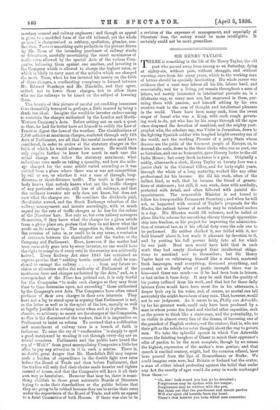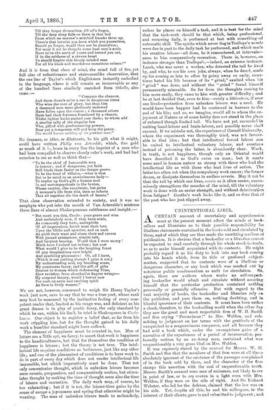SIR HENRY TAYLOR.
THERE is something in the life of Sir Henry Taylor, the old
poet wbo passed away from among us on Saturday, dying at eighty-six, without pain, without struggle, and without warning, save from his many years, which to the working man of letters should be specially fascinating. His whole career was evidence that a man may labour all his life, labour hard, and successfully, and for a living, yet remain throughout a man of letters, not merely interested in intellectual pursuits as, in a dilettante way, so many men are, but engrossed in them, pur- suing them with passion, and himself adding by his own creative work to the sum of thought and intellectual pleasure in the world. There have been many such, from the sweet singer of Israel who was a King, with such rough govern- ing work to do, yet who has by his songs through all the ages since deepened the devotion of mankind, and the mighty poet- prophet who, the scholars say, was Vizier in Jerusalem, down to the fighting Spanish soldier who laughed knight-errantry out of the world, and the working Premier of a petty State whose dramas are the pride of the foremost people of Europe, or, to descend the scale, down to the three clerks who, one as poet, one as historian, and one as humourist, gave literary lustre to the old India House ; but every fresh instance is a gain. Originally a middy, afterwards a clerk, Henry Taylor at twenty-four was a junior clerk in the Colonial Office, and for forty-eight years, through the whole of a long maturity, worked like any other professional for his income. He did his work, often of the dullest kind, so well, that he became the friend of genera- tions of statesmen ; but still, it was work, done with assiduity, perfected with detail, and often followed with painful dis- appointment. The responsible Minister is not bound to follow his irresponsible Permanent Secretary ; and when he will not, as happened with several of Taylor's proposals for the Blacks, the patient labour of months may be rendered useless in a day. His Minutes would fill volumes, and he toiled at plans like his scheme for smoothing slavery through apprentice- ship into freedom, or his project for improving the administra- tion of criminal law, as if his official duty were the sole one to be performed. He neither shirked it, nor trifled with it, nor held himself above it, but made it pleasant by devotion to it, and by putting his full powers fairly into all for which he was paid. Most men would have held that in such work they had amply discharged their intellectual obliga- tions to mankind and to themselves ; but Sir Henry Taylor kept on cultivating himself like a student, mastered fresh languages, read everything, discussed everything, and poured out as freely what of poetic strength there was in him—and there was much—as if he had been born to leisure, or had stolen it from duty. It may be said that the quality of his poetry suffered from his work, and that but for those daily
labours there would have been more fire in his utterances, a deeper lyric cry in his voice, and, of course, no mortal can tell accurately the might-have-been of any man. That, however, would not be our judgment. As it seems to us, Philip van Artevelde,
by far his greatest work, could only have been produced by a man in whom poetic fire fused and vivified other capacities, such as the power to think like a statesman, and the potentiality, to us visible in almost every line of the drama, of becoming one of the grandest of English orators,—of the orators, that is, who use their gift as the vehicle for sober thought about the way to govern men. We take the splendid speech in which Van Artevelde rouses the fainting burghers of Ghent to reject their oppressor's offer of pardon to be the most complete, though by no means the highest, expression of the author's true genius; and that speech is smelted oratory, might, had the occasion offered, have been poured from the lips of Demosthenes or Burke. We could imagine even now, had Britain or Ireland but the orator, a man of either island protesting against the belief that under any Act the enmity of ages would die away in words unchanged from these :—
" Oh, sirs ! look round you lest ye be deceived ; Forgiveness may be spoken with the tongue, Forgiveness may be written with the pen,
But think not that the parchment and mouth pardon Will e'er eject old hatreds from the heart. There's that betwixt you been which men remember
Till they forget themselves, till all's forgot, Till the deep sleep falls on them in that bed From which no morrow's mischief knocks them up. There's that betwixt you been which you yourselves, Should ye forgets would then not be yourselves ; For must it not be thought some base men's souls Have ta'en the seats of yours and turned you out, If in the coldness of a eraven,heart
Ye should forgive this bloody-minded man For all his black and murderous monstrous crimes P"
And it is from that class of mind, the mind full of fire, yet full also of reflectiveness and statesmanlike observation, that the one line of Taylor's which Englishmen instantly embodied in the language, where it will remain as immoveable as any of the hundred lines similarly snatched from Othello, also came :—
" Compute the chances, And deem there's ne'er a one in dangerous times Who wins the race of glory, but than him A thousand men more gloriously endowed Have fallen upon the course ; a thousand others Have had their fortunes foundered by a chance, Whilst lighter barks pushed past them; to whom add A smaller tally of the singular few Who, gifted with predominating powers, Bear yet a temperate will and keep the peace. The world knows nothing of its greatest men."
No dreamer, or idler, or dilettante, be his gift what it might, could have written Philip van Artcvelde, which, fine gold as much of it i•4, bears in every line the imprint of a man who had been compelled to observe closely ruler's work, and had had occasion to see as well as think that— "To be the chief of honourable men Is honour ; and if dangerous, yet faith Still binds them faster as the danger grows. To be the head of villains, what is that But to be mind to an unwholesome body— To render up God's gift a human soul In sad metempsychosis to the brutes, Whose carrion, else exanimate, bat gains A moment's life from this, then so infects That all together die the death of beasts."
That close observation extended to society, and it was no neophyte who put into the mouth of Van Artevelde's mistress these lines of almost Shakespearean subtleness and insight :-
" But mark you this, Cecile : your grave and wise
And melancholy men, if they have souls, As commonly they have, susceptible Of all impressions, lavish most their love Upon the blithe and sportive, and on such As yield their want and chase their sad excess With jocund salutations, nimble talk, And buoyant bearing. Would that I were merry !
Mirth have I valued not before ; but now What would I give to be the laughing fount Of gay imaginations ever bright And sparkling phantasies ! Oh, all I have, (Which is not nothing though I prize it not,) My understanding soul, my brooding sense, My passionate fancy, and the gift of gifts Dearest to woman which deflowering Time,
Slow ravisher, from olenched'at fingers •wrings—
My eorporal beauty, would I barter now For such an antic and exulting spirit As lives in lively women."
We are not, however, concerned to weigh Sir Henry Taylor's work just now, save to say that he was a true poet, whose rank may best be measured by the instinctive feeling of every com- petent reader that, limited as his range was, and deficient as his great drama is in play of poetic fancy, the only standard by which he can, within his limit, be tried is Shakespeare in Corio- lames. Our object is to register a belief that, so far from his work crippling him, but for the thought gained in his daily work a humbler standard might have sufficed.
The element of happiness must be counted in, too. Men of letters are a little apt, we fancy, to assert that work is happiness to the handicraftsmen, but that for themselves the condition of happiness is leisure ; but the theory is not true. The intel- lectual life requires conditions as buttresses, just like any other life ; and one of the pleasantest of conditions is to have work to do in part of every day which does not render intellectual life impossible, but which imperatively must be done. That not only concentrates thought, which in unbroken leisure becomes mere reverie, purposeless, and comparatively useless, but stimu- lates thought by making the time of thought seem also the time of leisure and recreation. The daily work may, of course, be too exhausting ; but if it is not, the leisure-time gains by the sense of escape a joyousness and spring that otherwise might be wanting. The man of unbroken leisure tends to melancholy,
unless he places on himself a task, and it is best for the mind that the task-work should be that which, -being professional, and recurring daily, is performed at last with sometbingeof automatic skill. The spirits which never flag in Trollope's novels were due in part to the daily task he performed, and which made his creative labour—all done, be it remembered, at intervals— seem to him comparatively recreation. There is, howeveri an instance stronger than Trollope's,--indeed, an extreme instance. Lamb, who was never a worker, who detested the toil he used by, and who, to use his own joke, always, when he dared, made np for coming so late to office by going away so early, some- times hated his life because of its "grind, exulted when his " grind" was done, and without the " grind " found himself permanently miserable. So far from the thoughts coming-to him more easily, they came to him with greater difficulty ; and he at last decided that, even to him—surely a litt4rateur, if ever one lived—protection from unbroken leisure was a need. He would have been happier had he continued in harness to the end of his life; and so, we imagine, would all to whom the en- joyment of Nature or of some hobby does not stand in the place of enforced though limited toil. We have. not yet succeeded in uniting hand-labour and brain-labour, and possibly never shall succeed. If we mistake not, the experience of Cornell University, where the experiment was thoroughly tried, was not favour- able to that idea ; but that intellectual forced labour can be united to intellectual voluntary labour, and sweetens instead of poisoning the latter, is abundantly clear. Work, in truth, is not happiness, though only an Oriental world have described it as God's curse on man ; but it meets some need in human nature as strong with those who lead the intellectual life as with those who lead lives of action. The latter too often rot when the compulsory work.ceases; the former dream, or dissipate themselves in endless reverie. May it not be that the toil by which one lives, corvee as it often seems, uncon- sciously strengthens the muscles of the mind, till the voluntary work is done with an easier strength, and without deterioration from fatigue ? Goethe's work looks like it, and so does that of the poet.who has just slipped away.



































 Previous page
Previous page